Environment
Women have always led the way when it comes to protecting the environment. Join us as we explore how women are connected to the world's resources, its wellbeing and its future.
Whether they're protecting their country's natural resources, providing food for their families, or saving seeds, women play a unique role in saving the earth. Discover unique tools women use to fight environmental degradation. Learn why natural disasters affect women most. Listen to our podcast with South African environmental activist Sibongile Musuku on how women's wisdom promotes conservation and read Curator Masum Momaya's introduction to this topic.
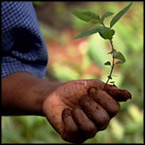 |
Roots of Peace >>Nobel Laureate Wangari Maathai grew a powerful world peace movement, the Greenbelt Movement, from the seed of an idea: teaching Kenyan women to plant trees. |
 |
Why Women Go Green >>Interview: Women far outnumber men in Green Parties around the world. Finnish Parliament member Janina Andersson explains why going green is so appealing to women. |
 |
Environmental Warriors >>Meet the new generation of women struggling against environmental degradation: Ukrainian Olya Melen, Kazakh Kaisha Atakhanova, Colombian Libia Grueso and Papua New Guinean Anne Kajir. |
 |
Picturing Breast Cancer >>Environmental toxins uniquely affect women's health. The traveling mural Who Holds the Mirror? is educating U.S. women about environmental links to breast cancer. |
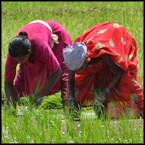 |
Seeds of Resistance >>Multinational corporations now patent seeds, forcing farmers to buy from them at high prices. Indian activist Vandana Shiva is fighting to keep seed saving, an ancient women's tradition, from becoming extinct. |
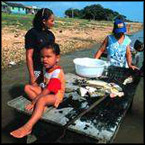 |
Measuring Mercury Hair by Hair >>Canadian writer Kelly Haggart tells an inspiring story of a group of Brazilian women who grew their hair in order to protect their local food supply from mercury contamination. |
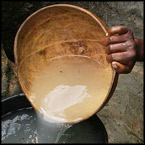 |
Water Woes >>Water is the most valuable resource on earth, considered by many to be a basic human right. Until recently, it was mostly free, but today, some governments are trying to privatize it. |
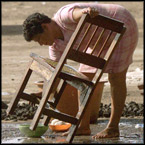 |
Swept Away >>Statistics show that during natural disasters, female victims greatly outnumber male ones. Women survivors are also more vulnerable and excluded from rebuilding efforts. Can women turn from victims into leaders? |

